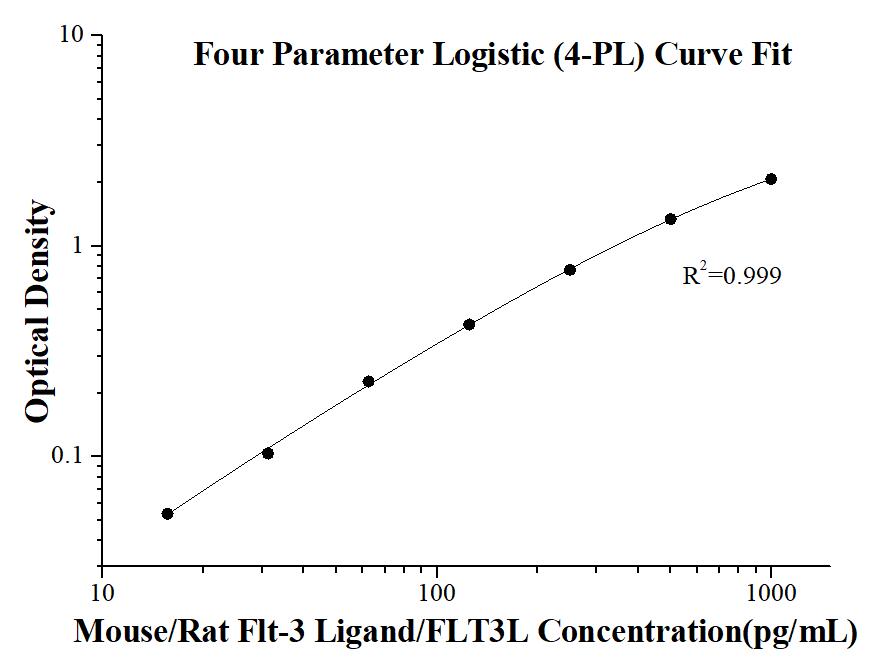Mouse/Rat Flt-3 Ligand/FLT3L ELISA Kit
Sensitivity
3.0 pg/mL
Range
15.6-1000 pg/mL
Reactivity
Mouse/Rat
Cat no : KE10072
Synonyms
Flt3lg, Flt3 ligand, Flt3l, Fms-related tyrosine kinase 3 ligand, Ly72L
Validation Data Gallery
Product Information
KE10072 is a solid phase sandwich Enzyme Linked-Immuno-Sorbent Assay (Sandwich ELISA). The mouse/rat Flt-3 Ligand/FLT3L ELISA kit is to be used to detect and quantify protein levels of endogenous mouse/rat Flt-3 Ligand/FLT3L. The assay recognizes mouse/rat Flt-3 Ligand/FLT3L. An antibody specific for mouse/rat Flt-3 Ligand/FLT3L has been pre-coated onto the microwells. The mouse/rat Flt-3 Ligand/FLT3L protein in samples is captured by the coated antibody after incubation. Following extensive washing, another antibody of biotinylated specific for mouse/rat Flt-3 Ligand/FLT3L is added to detect the captured mouse/rat Flt-3 Ligand/FLT3L protein. For signal development, Streptavidin-HRP is added, followed by Tetramethyl-benzidine (TMB) reagent. Solution containing sulfuric acid is used to stop color development and the color intensity which is proportional to the quantity of bound protein is measurable at 450 nm with the correction wavelength set at 630 nm.
| Product name | Mouse/Rat Flt-3 Ligand/FLT3L ELISA Kit |
| Tests | 1 X 96 well plate |
| Sample type | Mouse serum, Mouse plasma, Rat serum, Rat plasma |
| Assay type | Sandwich |
| Sensitivity | 3.0 pg/mL |
| Range | 15.6-1000 pg/mL |
| Reactivity | Mouse/Rat |
| Tested applications | Sandwich ELISA |
| Gene ID (NCBI) | 14256 |
Recovery
| Sample Type | Average | Range |
|---|---|---|
| Mouse serum | 103% | 95%-113% |
| Rat serum | 102% | 95%-112% |
IntraAssay
| Sample | n | mean ( pg/mL) | SD | CV% |
|---|---|---|---|---|
| 1 | 20 | 503.9 | 16.0 | 3.2 |
| 2 | 20 | 117.9 | 2.0 | 1.7 |
| 3 | 20 | 29.4 | 1.7 | 5.7 |
InterAssay
| Sample | n | mean ( pg/mL) | SD | CV% |
|---|---|---|---|---|
| 1 | 24 | 516.4 | 31.6 | 6.1 |
| 2 | 24 | 121.0 | 5.6 | 4.6 |
| 3 | 24 | 31.6 | 1.8 | 5.8 |
Background Information
Flt-3 Ligand, also known as FLT3L, is a cytokine that is of paramount importance in the proliferation of primitive hematopoietic progenitors. By acting on its receptor Flt-3 (CD135) and synergizing with other cytokines, FLT3L plays a pivotal role in promoting myeloid and lymphoid progenitors proliferation and differentiation. Besides regulating the development of immune cells during steady state conditions, FLT3L levels are raised upon inflammation. For example, increased serum levels of FLT3L has been observed during malaria in mice. Previous studies have shown that mice lacking FLT3L have deficient hematopoiesis function, resulting in reduced numbers of hematopoietic progenitor cells, dendritic cells, and natural killer cells.
Properties
| Storage Instructions | All the reagents are stored at 2-8℃ for 6 months or -20℃ for 12 months. Refer to the protocol for further storage instructions. |
| Synonyms | Flt3lg, Flt3 ligand, Flt3l, Fms-related tyrosine kinase 3 ligand, Ly72L |


